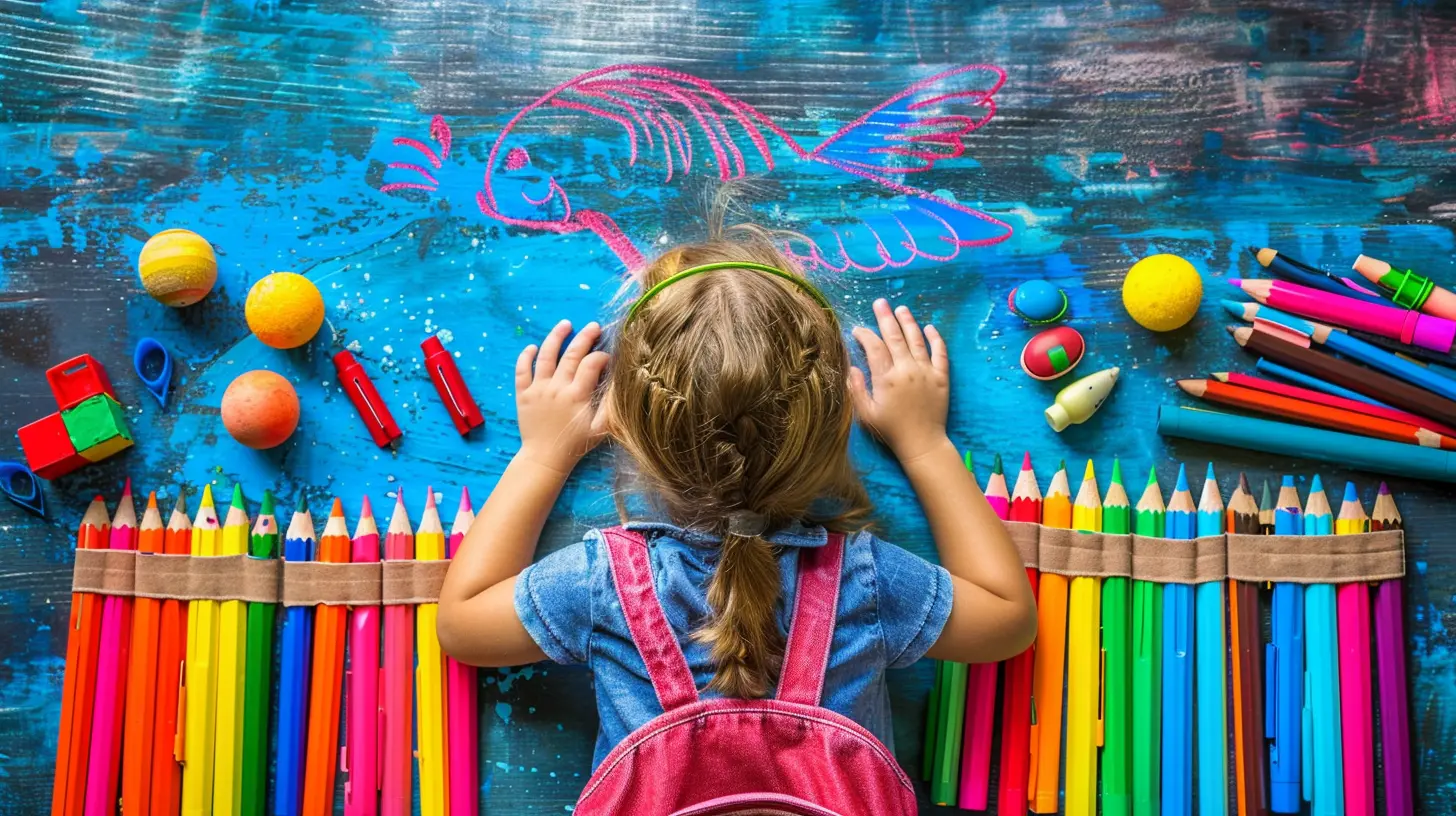The Importance of Sleep for School Readiness
29 June 2025
Pulling an all-nighter might cut it in college, but for your preschooler or soon-to-be kindergartener? Not so much.
Sleep isn't just some luxury reserved for Sundays or long naps after Thanksgiving turkey. In fact, when it comes to preparing your child for school, sleep is one of the most overlooked and underestimated superheroes in your parenting toolkit.
So, if you’ve ever wrestled with a tiny human at 9:00 PM who insists they’re “not tired”—you’re not alone. But before you give in to another episode of Paw Patrol, let’s talk about why sleep is the secret sauce to school readiness and why it deserves a spot right next to backpacks and lunchboxes.

What Is “School Readiness,” Anyway?
Before we dive into the cozy cocoon that is dreamland, let’s unpack this term—school readiness.School readiness means your child is socially, emotionally, physically, and cognitively prepared to thrive in a classroom setting. It’s not just about knowing the ABCs or how to hold a pencil, it’s also about being able to sit still, pay attention, follow directions, and deal with little life stresses—like sharing crayons or dealing with a spilled juice box.
Now here's where it gets interesting: every single one of those skills is tightly tied to how well your child sleeps. Yep, sleep doesn’t just recharge their batteries—it’s like the operating system update for their little developing brains.

Why Sleep Matters More Than You Think
Let’s break it down. Sleep is like a nightly brain bath. While your child is snoozing, their brain is hard at work:- Strengthening memory
- Processing emotions
- Recharging attention span
- Growing (ever wonder why they shoot up overnight?)
Lack of sleep? That’s like trying to run a marathon with shoelaces tied together. When kids don’t get enough shut-eye, they’re more likely to be moody, forgetful, easily distracted, and less equipped to handle new challenges—aka, everything that school throws their way.
Let’s Talk Numbers: How Much Sleep Do Kids Really Need?
Great question! The American Academy of Sleep Medicine lays it out pretty clearly:- Preschoolers (3–5 years): 10–13 hours per 24 hours (including naps)
- School-aged kids (6–12 years): 9–12 hours at night
That doesn’t mean your 5-year-old has to hit the sack exactly at 7:48 PM sharp, but it does mean bedtime routines should make sleep a priority—not an afterthought.

The Sleep–Brain Connection
We all know adults feel groggy and cranky without enough sleep, but kids? They can be straight-up emotional tornadoes.Here’s what the research and experts keep shouting from rooftops: not enough sleep in early childhood is linked to:
- Attention problems: Harder time focusing, which can make learning tough.
- Memory issues: Hard to remember letters or numbers when your brain’s half asleep.
- Emotional regulation struggles: More tantrums, anxiety, or meltdowns.
- Lower academic performance: Yes, even in kindergarten.
- Behavioral issues: Acting out, impulsivity, and hyperactivity. Sometimes misdiagnosed as ADHD.
Long story short? Sleep isn't optional—it's foundational.

All Aboard the Sleep Train: Creating a Healthy Bedtime Routine
Okay, so now we know sleep = awesome and essential. But how do you actually get your kiddo to go to bed without a nightly negotiation that rivals a United Nations summit?Here’s the good news: Kids crave routines. A consistent, cozy bedtime routine can work wonders.
Your Go-To Evening Wind-Down Checklist
1. Set a consistent bedtime (Yes, even on weekends. A tired Monday is no one’s friend.)2. Turn off electronics an hour before bed (Blue light = bedtime kryptonite.)
3. Create a calming routine (Bath, PJs, storytime, cuddles. Repeat.)
4. Keep the bedroom cool, dark, and quiet (A sleep cave, basically.)
5. Watch caffeine and sugar (No cookies at 7 PM. Sorry, grandma.)
Little tweaks can make a big difference. And remember, kids mirror you. If they see you scrolling TikTok under the covers, guess what they’ll want to do?
Sleep Trouble? You’re Not Alone
Every kid goes through phases. One month they're sleeping like a rock, the next they’re waking you up at 2 AM because they need a glass of water, a different stuffed animal, or something else absolutely non-essential.Common issues include:
- Separation anxiety at bedtime
- Nightmares or night terrors
- Difficulty settling down
- Fear of the dark
What Can You Do?
- Stay calm but firm: Comfort them, but don’t encourage prolonged wake-ups.- Use a night light: Sometimes having a soft glow can ease anxiety.
- Try guided meditations for kids: YouTube and apps like Moshi are full of them.
- Stick to the routine: Consistency = comfort.
If things really get hairy and sleep issues persist longer than a few weeks, it might be time to talk to your pediatrician.
Some Real Talk: Parents Need Sleep Too
Here’s the truth bomb: your kid’s sleep affects your sleep, too. And when you're sleep-deprived, you're more likely to be stressed, snappy, and stuck in survival mode.Helping your child develop good sleep habits isn’t just good for them—it’s a game-changer for the whole household. It’s like setting the reset button every night. Everyone wakes up refreshed, ready to tackle the day (and maybe even breakfast without tears!).
Sleep vs. Screen Time: The Battle of Bedtime
Let’s address the glowing rectangle elephant in the room—screens.Tablets, phones, and TVs can seem like magical babysitters, but they mess with melatonin (that’s the sleep hormone, folks). Blue light tricks the brain into thinking it’s daytime, which delays sleep and disrupts sleep cycles.
Some Screen-Time Swaps Before Bed:
- Storybooks (especially the ones with voices that make you laugh)- Calming music or lullabies
- Drawing or coloring
- Simple puzzles or quiet play
Make “screen-free wind-down” part of your daily rhythm. Your child’s future teacher will thank you.
Naps Count Too!
If your child is still napping, hallelujah. But as they inch closer to school age, naps start to fade, and nighttime sleep becomes even more crucial.If your little one drops their nap, you may need to shift bedtime earlier to make up for it. More hours at night = a smoother transition into full-day school schedules.
Signs They’re Ready to Drop the Nap:
- Taking forever to fall asleep at night- Fighting naps daily
- Waking up earlier even after a nap
- Not cranky in the evening without one
It’s a bittersweet goodbye. But trust that their body is adjusting—and you're entering a new routine chapter.
How Sleep Shapes the First Day of School
Imagine showing up for your first day at a new job on 4 hours of sleep. You’re lost, everyone looks unfamiliar, you can't sit still, and you’re trying not to cry. That’s what school feels like to an overtired 5-year-old.Sleep helps kids:
- Cope with separation anxiety
- Handle social dynamics
- Follow classroom rules
- Soak in new information
- Enjoy the learning process
A well-rested child walks into school with their emotional backpack zipped up and ready. And that sets the tone for a positive experience—for them and their teacher.
Quick Tips for Sleep-Friendly Homes
Let’s end with a little cheat sheet:✔️ Prioritize consistent bedtime and wake-up time
✔️ Watch out for sneaky sugar and caffeine
✔️ Create downtime before sleep
✔️ Say bye-bye to screens an hour before bed
✔️ Make the bedroom a peaceful space
✔️ Check for sleep disruptors like snoring or frequent waking
✔️ Be patient and consistent
Even small changes can move the needle in the right direction.
Final Thoughts: Let’s Tuck This All In
Getting your child ready for school isn’t all flashcards and learning apps. It’s about building a foundation—and that starts with sleep. It's the glue that holds the rest of their development together.So tonight, when you're tempted to let your child stay up "just five more minutes," remember that giving them an early bedtime is one of the most loving, supportive things you can do.
It’s not just bedtime—it’s brain time.
all images in this post were generated using AI tools
Category:
School ReadinessAuthor:

Noah Sawyer
Discussion
rate this article
2 comments
Rowan Snow
Sleep plays a crucial role in a child's development and school readiness. Adequate rest enhances cognitive function, emotional regulation, and overall well-being, making it essential for optimal learning. Prioritizing consistent sleep schedules and creating a calming bedtime routine can significantly impact a child's academic success and social behaviors.
October 30, 2025 at 5:07 PM

Noah Sawyer
Absolutely! Sleep is vital for children's growth and learning. Establishing a consistent sleep routine can greatly enhance their cognitive and emotional skills, setting them up for success in school and beyond.
Faelith McCloud
Sleep is like a superhero cape for kids—without it, they're just regular kids in pajamas! Remember, well-rested munchkins make for smoother school mornings!
July 10, 2025 at 5:07 AM

Noah Sawyer
Absolutely! Sleep truly empowers kids, helping them thrive and be their best selves in school. Well-rested kids are ready to conquer their day!


